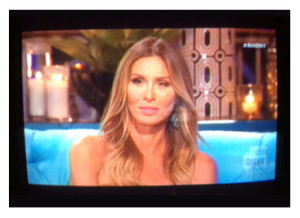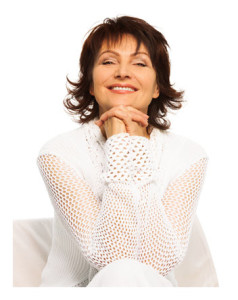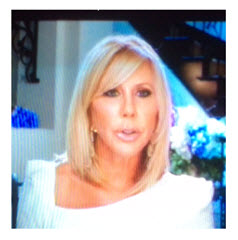When a gentleman I work with made a cutting remark based on someone’s age — the reference was to an applicant for a position — my ears perked up. The position was beginner level in terms of skill set and opportunities, and he dismissed the individual immediately based on age.
About five years younger than myself.
As our conversation progressed, it was clear there were other attributes that made this candidate entirely unsuitable, but the first characteristic he noticed — and commented on — was age.
The gentleman in question is not yet 30.
When Reality TV Reflects Reality
On a recent New York Housewives episode — and to quote Sex and the City, “It’s my thing; get over it” — the Countess was “age shaming” Carole Radziwill over the age of the man with whom she’s in a relationship. Ms. Radziwill is 52 and her boyfriend is 29. According to the Countess, who is 50, it is fine to sleep with much younger men, but you don’t have relationships with them. Please note: I’m paraphrasing.
 While Ms. Radziwill’s other show friends seem unconcerned or fully supportive, I believe the Countess is voicing what most Americans continue to believe: the older man-younger woman dynamic is fine; the opposite, unseemly.
While Ms. Radziwill’s other show friends seem unconcerned or fully supportive, I believe the Countess is voicing what most Americans continue to believe: the older man-younger woman dynamic is fine; the opposite, unseemly.
The “Inexperience” Trap
In still another conversation that played out between myself and a friend — both of us may be considered “women of a certain age” (in other words, over 45) — we dismissed the remarks of a mutual acquaintance (age 30) relative to a professional topic. My friend and I have a collective pool of 40 years of related experience between us; the 30-year-old has less than a year.
Should we have been more focused on the poor performance that was the crux of the problem, in large part due to inexperience? Couldn’t she have been 30 with seven years of experience and capably handling the job? Was it her immaturity in responding to attempts from my friend to assist her — my friend is her mother’s age — that had us pointing out her years?
Cultural Bias – Job Opportunities
We all make assumptions about others — constantly. We make assumptions without knowing details, context, or the individuals involved. Yet I hasten to point out some important distinctions in these three separate circumstances.
The first scenario represents a very real and all too common response to anyone 50 and older when it comes to job opportunities. The 50-something in the first scenario may have spent 20 years raising kids, and was now looking to re-enter the job market. If she has the same potential to perform the work as a 30-year-old, why shouldn’t she be given that opportunity, especially as we expect interns and beginners to leave after a year or two?
Cultural Bias – Relationships, Etc.
The second scenario involves deeply held gender prejudice about what makes for an “appropriate” relationship. There is an assumption that a younger man (or for that matter woman — shall we mention the Vicki-Meghan conflict on RHOC?) — has insufficient substance (and therefore staying power) for a relationship with someone who is older. Unless of course there is money and power and privilege involved.
 The third scenario, while mentioning age, is an issue of a brash person with little experience who doesn’t have the perspective of two (not brash) people with extensive experience. That we both threw the age factor in reflects how easily (and thoughtlessly) we all do this.
The third scenario, while mentioning age, is an issue of a brash person with little experience who doesn’t have the perspective of two (not brash) people with extensive experience. That we both threw the age factor in reflects how easily (and thoughtlessly) we all do this.
Yet even if we recognize this as the result of cultural bias, cultural bias does not absolve us of personal responsibility for our actions.
We All Lose…
Assumptions a-plenty?
You bet.
The 20-somethings and 30-something dissing and dismissing the 50s, 60s, 70s and so on?
Yes indeed.
In a working context — potentially devastating, on both ends of the spectrum.
In a personal or social context — hypocritical, subjective, and a bit of a shame.
 When we’re 20, most of us are obtuse with regard to the 40+ crowd. No doubt I wasn’t an exception, at least to a degree. The time I had spent in France already at that point in my life lessened the age (and ageist) assumptions to a degree, by virtue of the mixing of I had experienced.
When we’re 20, most of us are obtuse with regard to the 40+ crowd. No doubt I wasn’t an exception, at least to a degree. The time I had spent in France already at that point in my life lessened the age (and ageist) assumptions to a degree, by virtue of the mixing of I had experienced.
When “Old” Is a Slur
That the young view the older as “old” isn’t news. That “old” is a moving target is something any of us over 40 will understand. That the term “old” is considered pejorative is also obvious. In fact, most of us misuse it without thinking; sometimes we hurl it as a barb. I will point out another pop culture reference — on Real Housewives of Orange County, when 30-year-old Meghan King Edmonds called Vicki Gunvalson, 53, a bitter “old” woman.
Meant as an insult, it was received as intended.
That the young see mature adults as too distant from their reality to offer a viable point of view is understandable, and may be inevitable. That they dismiss or disrespect them — something I was taught not to do — is the result of rampant disrespect in contemporary culture. That mature adults do the same when it comes to the 20-somethings and 30-somethings, however brash they may seem at moments, is equally disrespectful — and foolish.
Shouldn’t we know better? Or is that, too, an ageist assumption?
You May Also Enjoy

Great insights. Ageism (going in both directions) is a real challenge these days and any sort of dialogue that gets people thinking more about their comments, behaviors (and those assumptions!) is a good thing!
I agree it cuts both ways. In a work environment the criteria should be about a person’s skills, experience, energy, and willingness to learn and adapt.
Sadly, many “older” workers don’t even get that far as to be considered for their skills, experience, energy and so on.
I am one of those over 50 women who entered the job market again three years ago after a long absence raising the children. It started out very much as an entry level office job and grew into something quite rewarding and challenging in a few years. But there is no doubt in my mind that I would have never been considered for the job had my boss and I not shared a casual acquaintance for a couple of years prior.
Bravo, Cornelia. This is not easy to do. Personal connections (and continuing to bulid a network of connections) seems to make all the difference.
I am so delighted that that Elizabeth introduced me to your blog. It is four in the morning and I am immersed in your old posts. Where have you been all my life!!!
What a fabulous comment, Cindy. Thank you! 🙂